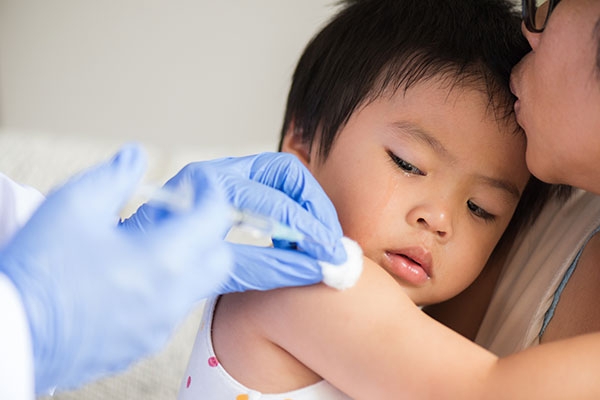5 Reasons Why Basic Childhood Immunizations Should Never Be Skipped

Watching a child receive a vaccine shot is never easy, especially if you still have concerns about vaccine safety or have heard rumors claiming that immunization can cause health problems.
These concerns often prompt parents to hesitate, leading them to delay or even skip vaccinations for their children.
In reality, childhood is a phase when children are highly vulnerable to infectious diseases.
During this period, their bodies are experiencing rapid growth and development, but their immune systems are still maturing. Without additional protection, such as vaccines, their bodies may not be ready to fight off serious diseases.
Why is childhood immunization so important?

1. Protects children from dangerous diseases
Basic immunizations protect against serious illnesses such as measles, diphtheria, pertussis, hepatitis B, polio, and others.
These diseases do not just cause severe symptoms—they can lead to long-term complications and even be life-threatening.
Vaccines help the body recognize and fight infections before the disease can take hold.
For example:
- Polio once caused paralysis in hundreds of thousands of children each year, but is now nearly eliminated.
- The MMR vaccine protects against measles, which can lead to blindness and permanent brain damage.
- The hepatitis B vaccine protects against serious liver disease.
2. Builds immunity from an early age
A child’s immune system is still developing and not yet fully mature.
Immunization gives the body early “training” to recognize harmful viruses or bacteria. When real exposure occurs, the immune system is already prepared to respond quickly and effectively.
3. Reduces the risk of spreading disease to others
Vaccinated children protect not only themselves, but also those around them, including:
- Newborns who are still too young to be vaccinated
- Individuals with certain medical conditions (such as cancer patients undergoing therapy)
- Older adults who are at higher risk
The more people who are vaccinated, the less likely the disease will spread in a community—a principle known as herd immunity.
4. Prevents disease outbreaks
Many diseases that once caused large outbreaks are now rare thanks to immunization programs.
However, if vaccination rates drop, these diseases can return. Routine childhood immunization is a critical step in preventing future outbreaks and protecting communities.
5. A long-term health investment
Immunisation protects children not only today, but also in the years ahead. Children who stay healthy can learn more effectively, play freely, and grow without long-term health problems.
Vaccination also helps reduce the cost and burden of treatment if a child were to contract a serious disease.
Some vaccines even protect against illnesses that can develop into chronic conditions later in life. For example:
- The hepatitis B vaccine prevents infections that may lead to liver cancer in adulthood.
- The HPV vaccine (given in childhood or adolescence) protects against cervical cancer and other types of cancer.
Starting vaccination early helps guide children toward a healthier future.
Consequences of Skipping Immunization

Failing to vaccinate children can have serious consequences that affect both individuals and the wider community:
1. Re-emergence of diseases
Regions with low vaccination rates have seen outbreaks of measles, pertussis, and polio.
This also occurred after the COVID-19 pandemic, when movement restrictions led to many children missing their routine immunizations.
In 2020, Indonesia reported a polio outbreak in Aceh.
2. Increased community vulnerability
Unvaccinated children can transmit disease to those who cannot be vaccinated.
3. Higher mortality rates
In areas with insufficient vaccination coverage, preventable diseases continue to cause deaths.
4. Pressure on the healthcare system
Outbreaks trigger costly emergency response measures, hospitalizations, and ongoing care needs.
Even a single case of a preventable disease can escalate into a community-wide epidemic, putting many lives at risk.
Protect Your Child’s Future Today
Don’t delay your child’s immunizations. Protect their growth and future by ensuring they receive complete basic vaccines according to schedule.
Consult with a doctor or visit GWS Medika Clinic in Jakarta to schedule your child’s vaccinations today.



